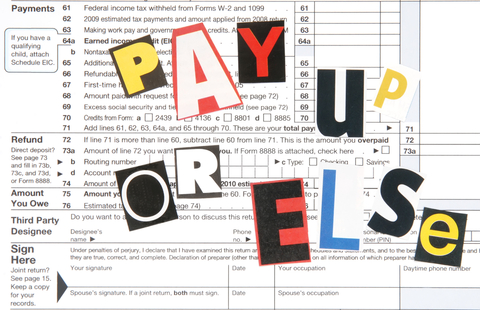Here in America, we're used to people running to court every time life throws a curveball. Spill hot coffee in your lap? Sue McDonald's! Get drunk, drive your car into a bay, and drown because you can't open your seat belt underwater? Mom and Dad can still sue Honda and win $65 million! Electrocute yourself trying to rob a bar? There's a lawyer for that!
in America, we're used to people running to court every time life throws a curveball. Spill hot coffee in your lap? Sue McDonald's! Get drunk, drive your car into a bay, and drown because you can't open your seat belt underwater? Mom and Dad can still sue Honda and win $65 million! Electrocute yourself trying to rob a bar? There's a lawyer for that!
Earlier this month, though, we saw some satisfying comeuppance in one of those cases that makes us roll our eyes in amazement.
First, a little history. UBS is Switzerland's biggest bank — and, like most Swiss banks, it used strict Swiss secrecy laws to attract depositors. They solicited Americans to open accounts, knowing full well that many of them were using those accounts to cheat the IRS — and in some cases, even advising them how to do it. In 2007, a disgruntled employee blew the whistle (and earned a record $104 million reward in the process). Two years later, UBS paid $780 million
 it comes to audits, our friends at the IRS are interested in examining returns as accurately as possible. (No, they're not just interested in squeezing out more tax, and some audits actually result in refunds.) So the folks in the Small Business/Self-Employed area have compiled a series of Audit Technique Guides to help examiners with insight into issues and accounting methods unique to specific industries. As the IRS explains, "ATGs explain industry-specific examination techniques and include common, as well as unique, industry issues, business practices and terminology. Guidance is also provided on the examination of income, interview techniques and evaluation of evidence."
it comes to audits, our friends at the IRS are interested in examining returns as accurately as possible. (No, they're not just interested in squeezing out more tax, and some audits actually result in refunds.) So the folks in the Small Business/Self-Employed area have compiled a series of Audit Technique Guides to help examiners with insight into issues and accounting methods unique to specific industries. As the IRS explains, "ATGs explain industry-specific examination techniques and include common, as well as unique, industry issues, business practices and terminology. Guidance is also provided on the examination of income, interview techniques and evaluation of evidence." it comes to audits, our friends at the IRS are interested in examining returns as accurately as possible. (No, they're not just interested in squeezing out more tax, and some audits actually result in refunds.) So the folks in the Small Business/Self-Employed area have compiled a series of Audit Technique Guides to help examiners with insight into issues and accounting methods unique to specific industries. As the IRS explains, "ATGs explain industry-specific examination techniques and include common, as well as unique, industry issues, business practices and terminology. Guidance is also provided on the examination of income, interview techniques and evaluation of evidence."
it comes to audits, our friends at the IRS are interested in examining returns as accurately as possible. (No, they're not just interested in squeezing out more tax, and some audits actually result in refunds.) So the folks in the Small Business/Self-Employed area have compiled a series of Audit Technique Guides to help examiners with insight into issues and accounting methods unique to specific industries. As the IRS explains, "ATGs explain industry-specific examination techniques and include common, as well as unique, industry issues, business practices and terminology. Guidance is also provided on the examination of income, interview techniques and evaluation of evidence."




